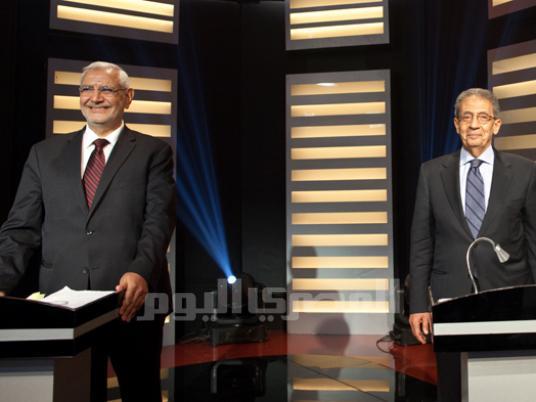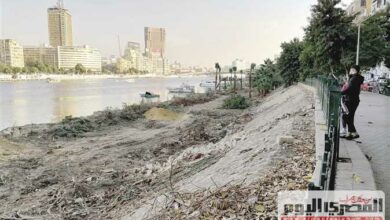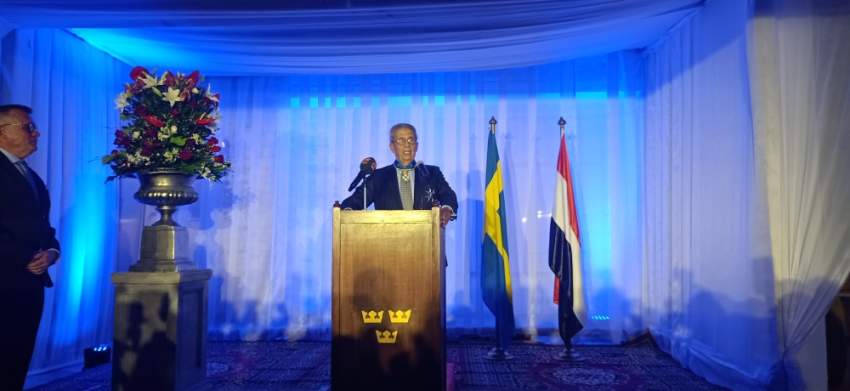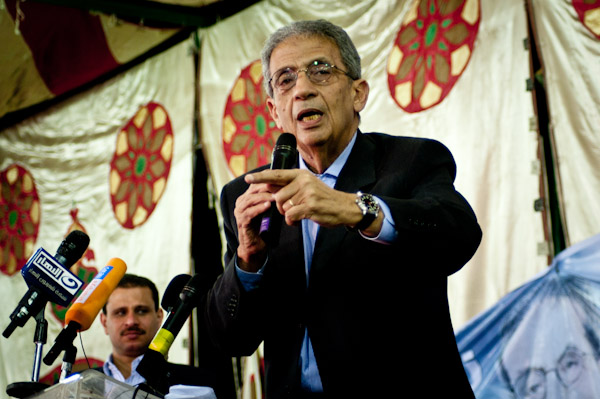
“I don’t usually watch these types of shows,” Abu Ahmed said, frowning as he flipped through television channels. “But I need to know which one of these jackasses is soon going to be riding me.”
The first half of the 51-year-old’s statement is a little misleading; nobody in the Arab world makes a habit of watching “these types of shows,” mainly because before Thursday night, none has ever been broadcast.
The television program Abu Ahmed was tuning into is the most recent chapter in a series of unprecedented events; Amr Moussa and Abdel Moneim Abouel Fotouh, the two forerunners in the ongoing presidential elections, met on live television for the region’s first-ever presidential debate.
“So, what exactly are they going to do?” he asked, setting down the remote control as the onscreen panel continued to explain just that.
The Dar el-Salam grocer, who a few years ago added a fruit stand to his cramped corner shop, seemed more interested in his customers than the history crackling out of his tiny television. Across from his establishment is a larger café, the owner of which could not be persuaded to screen the debate, instead of Gladiator TV, to his patrons.
“Can’t you see they’re watching wrestling?” he said.
Abu Ahmed also wasn’t convinced at first, not even having been aware of the debate. His son, Ahmed, claimed to have known that it was happening, but “wasn’t sure when.” He intermittently tuned in, moving back and forth between the internet café next door.
Over the course of the debate, others did as well, with some even migrating from both cafés—cyber and Gladiator—to check in on the candidates and, in the words of one visitor, “see if the fighting’s started.” Shuffling around for the first chunk of the debate, Abu Ahmed eventually seated himself, and watched in silence. But he got up again.
“That thing was four hours long,” he later said incredulously. “And what did I learn? Nothing. Apart from the fact that Abouel Fotouh is an idiot.”
For Abu Ahmed, as well as the other occasional watchers, there was ample evidence to support this claim, the first outburst coming with Abouel Fotouh’s proposal to “restructure” the nation’s police and central security forces.
“That’s not the way to do it,” Abdel Aziz, a middle-aged carpenter, scoffed at the candidate’s suggestion. “All those police officers have mental illnesses. You can’t ‘restructure’ something like that.”
Similarly, Abouel Fotouh’s somewhat naïve plan to keep his presidential office “accessible to the people” by situating it in a “small, ground floor apartment,” was met with howls of disbelief, and insults.
“The man wants to be a doorman!” Abu Ahmed said as he slapped his palms together.
“You’re a bum,” Abdel Aziz shouted at the screen. “You think Obama’s going to come visit you in your basement?”
And so it continued, with most of Abouel Fotouh’s suggestions and statements instantly ridiculed, sometimes it seems, merely for not having been uttered by his rival instead.
“Look at that man,” Abel Aziz said of the second candidate who, onscreen, was describing Abouel Fotouh’s "humble" intentions as an insult to national prestige.
“I swear, Amr Moussa is a prince,” the carpenter gushed.
It may be somewhat surprising that Moussa, with his well-known ties to the former regime, would find popularity in lower-income neighborhoods like Dar el-Salam which, as recently as last year’s parliamentary elections, was dominated by, and helped give rise to, political Islamists. However, the months since seemed to have resulted in a new kind of disappointment—besides Abouel Fotouh, the walls of Dar-el-Salam mostly display promotional material for Mohamed Morsy and Mohamed Selim el-Awa, both Islamist candidates, as well as disqualified Salafi sheikh and lawyer Hazem Salah Abu Ismail.
It is worth noting that, from Egypt Independent’s vantage point, none of the candidates had been spared the indignity of having their faces scratched off their posters. Amr Moussa, on the other hand, is a familiar face in uncertain times, and that has its advantages.
“Who is Abouel Fotouh?” was a frequently voiced question throughout the night, with hardware store owner Mohamed Yehia finally explaining his disdain for Abouel Fotouh’s relative anonymity.
“We all know Amr Moussa,” he said. “We’ve been hearing his name for years. If Abouel Fotouh really has been working this hard for the country, we would have at least heard his name before.”
Despite having left the Muslim Brotherhod over a year ago in order to pursue his presidential aspirations, Abouel Fotouh was still almost exclusively referred to by the neighborhood viewers as the ‘Ikhwani,’ or Brotherhood member. Yet, it is Amr Moussa who Abu Ahmed said has arrived on a wave of divine intervention.
“Watching this debate, I really believe that God has sent Amr Moussa to be our savior,” Abu Ahmed said. “If the Brotherhood or any of these so-called religious parties practiced true Islam, I would vote for them. I’d be the first in line to do so. But they’re criminals. They’re gangs, all of them, and now God has sent someone to keep them from spreading their own monstrous misinterpretation of Islam.”
“But I don’t want to talk about religion,” he added, and the others agreed that the focus should remain on politics: a realm in which Moussa clearly maintained the upper hand.
“Amr Moussa has experience, he knows how to talk,” said Abu Ahmed. “Did you see the way Abouel Fotouh talked about Israel? The man’s going to start a war.”
The grocer proceeded to explain to his son and Abdel Aziz, “Moussa said Israel behaves like an enemy and that there’s a deep tension between our countries, but he wouldn’t directly call them an enemy because doing so would be no different than declaring war.”
“See?” he concluded, prodding the carpenter. “We need someone who understands these things, not a president who’s no less ignorant than you.”
For 24-year-old Ahmed, the decision was far simpler.
“You heard [Abouel Fotouh] say it yourself: the man can’t even pay for all his promotional material that’s already out there,” he said. “I don’t want a president who, on day one, is already LE7 million in debt. What are you, crazy?”
His father leaned in.
“With Abouel Fotouh, you’ll be putting on your sirwal and going off on jihad,” he said. Sirwal are cotton pants worn by conservative Muslims who aim to dress as the Prophet Mohamed did in his time.
He turned to Egypt Independent.
“Amr Moussa one hundred and twenty percent,” Abu Ahmed said.
“Agreed. Now let’s see what else is on,” his son said. He picked up the remote control, and surfed for wrestlers.




